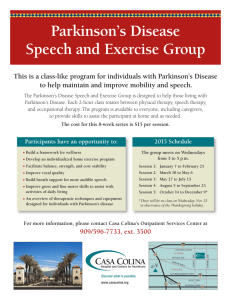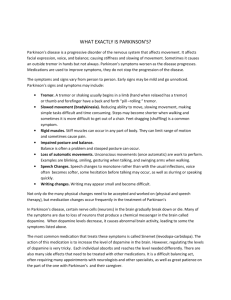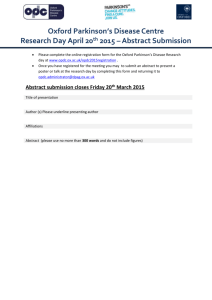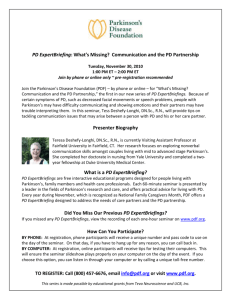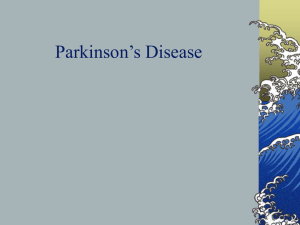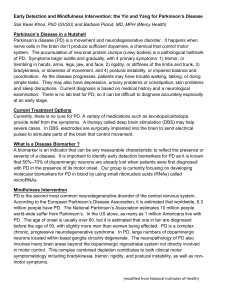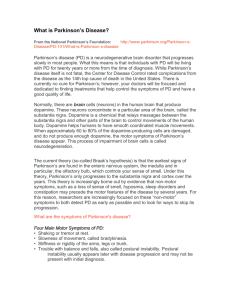what are the symptoms of parkinson's disease?
advertisement
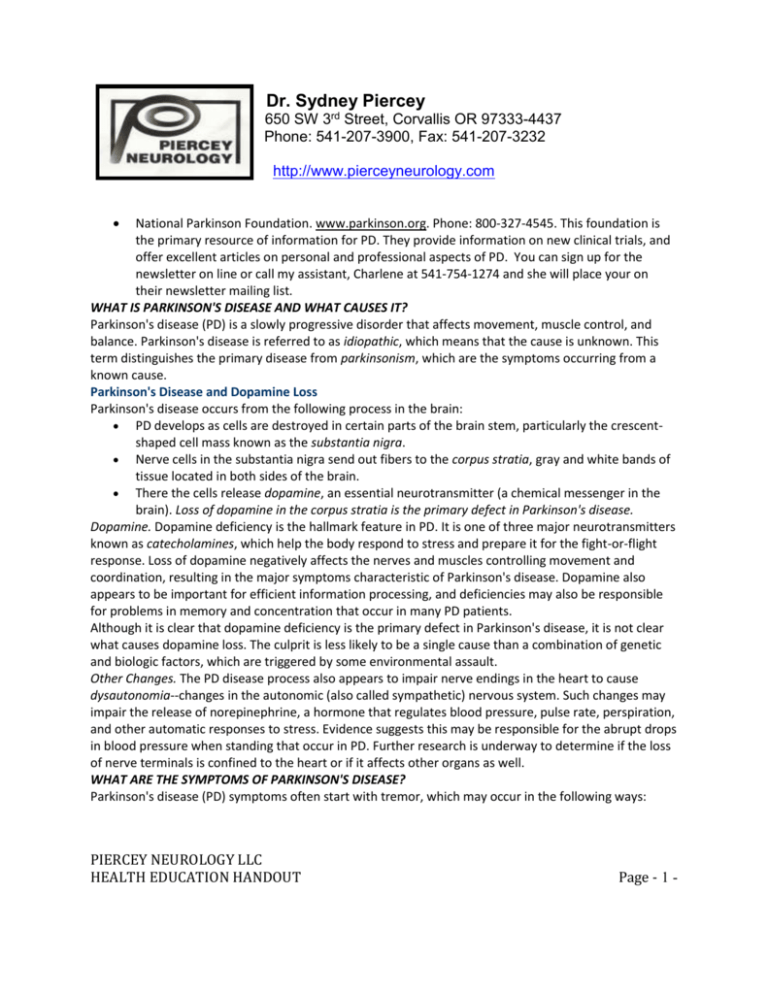
Dr. Sydney Piercey 650 SW 3rd Street, Corvallis OR 97333-4437 Phone: 541-207-3900, Fax: 541-207-3232 http://www.pierceyneurology.com National Parkinson Foundation. www.parkinson.org. Phone: 800-327-4545. This foundation is the primary resource of information for PD. They provide information on new clinical trials, and offer excellent articles on personal and professional aspects of PD. You can sign up for the newsletter on line or call my assistant, Charlene at 541-754-1274 and she will place your on their newsletter mailing list. WHAT IS PARKINSON'S DISEASE AND WHAT CAUSES IT? Parkinson's disease (PD) is a slowly progressive disorder that affects movement, muscle control, and balance. Parkinson's disease is referred to as idiopathic, which means that the cause is unknown. This term distinguishes the primary disease from parkinsonism, which are the symptoms occurring from a known cause. Parkinson's Disease and Dopamine Loss Parkinson's disease occurs from the following process in the brain: PD develops as cells are destroyed in certain parts of the brain stem, particularly the crescentshaped cell mass known as the substantia nigra. Nerve cells in the substantia nigra send out fibers to the corpus stratia, gray and white bands of tissue located in both sides of the brain. There the cells release dopamine, an essential neurotransmitter (a chemical messenger in the brain). Loss of dopamine in the corpus stratia is the primary defect in Parkinson's disease. Dopamine. Dopamine deficiency is the hallmark feature in PD. It is one of three major neurotransmitters known as catecholamines, which help the body respond to stress and prepare it for the fight-or-flight response. Loss of dopamine negatively affects the nerves and muscles controlling movement and coordination, resulting in the major symptoms characteristic of Parkinson's disease. Dopamine also appears to be important for efficient information processing, and deficiencies may also be responsible for problems in memory and concentration that occur in many PD patients. Although it is clear that dopamine deficiency is the primary defect in Parkinson's disease, it is not clear what causes dopamine loss. The culprit is less likely to be a single cause than a combination of genetic and biologic factors, which are triggered by some environmental assault. Other Changes. The PD disease process also appears to impair nerve endings in the heart to cause dysautonomia--changes in the autonomic (also called sympathetic) nervous system. Such changes may impair the release of norepinephrine, a hormone that regulates blood pressure, pulse rate, perspiration, and other automatic responses to stress. Evidence suggests this may be responsible for the abrupt drops in blood pressure when standing that occur in PD. Further research is underway to determine if the loss of nerve terminals is confined to the heart or if it affects other organs as well. WHAT ARE THE SYMPTOMS OF PARKINSON'S DISEASE? Parkinson's disease (PD) symptoms often start with tremor, which may occur in the following ways: PIERCEY NEUROLOGY LLC HEALTH EDUCATION HANDOUT Page - 1 - Dr. Sydney Piercey 650 SW 3rd Street, Corvallis OR 97333-4437 Phone: 541-207-3900, Fax: 541-207-3232 http://www.pierceyneurology.com Tremors may first be only occasional, starting in one finger and spreading over time to involve the whole arm. The tremor is often rhythmic, 4 to 5 cycles per second, and frequently causes an action of the thumb and fingers known as pill rolling. Tremors can occur when the limb is at rest or when it is held up in a stiff unsupported position. They usually disappear briefly during movement and do not occur during sleep. Tremors can also eventually occur in the head, lips, tongue, and feet. Symptoms can occur on one or both sides of the body. In one study, 44% of patients reported experiencing internal tremors lasting less than half an hour, but occurring several times a week. In younger patients tremor is usually predominant and often suggests a less aggressive form of the disease. Some evidence suggests that tremor in PD may occur from mechanisms in the brain that are different from those that cause other PD symptoms. Motion and Motor Impairment A number of PD symptoms involve motor impairment caused by the abnormalities in the brain that regulate movement: Slowness of motion ( bradykinesia) is one of the classic symptoms of Parkinson's disease. Patients may eventually develop a stooped posture and a slow, shuffling walk. The gait can be erratic and unsteady. After a number of years, muscles may freeze up or stall, usually when a patient is making a turn or passing through narrow spaces, such as a doorway. Intestinal motility (the ability to swallow, digest, and eliminate) may slow down, causing eating problems and constipation. Muscles may become rigid ( akinesia). This symptom often begins in the legs and neck. Muscle rigidity in the face can produce a mask-like, staring appearance. Motor abnormalities that limit action in the hand may develop in late stages. Handwriting, for instance, often becomes diminutive. Normally spontaneous muscle movements, such as blinking, may need to be done consciously. Other Symptoms of Parkinson's Disease Depression caused by chemical changes in the brain may be an early symptom of Parkinson's. Depression is a common problem in older people, however, and it is likely not to be recognized as a symptom. Orthostatic hypotension. Some patients experience a sudden drop in blood pressure when they stand. This can cause dizziness and fainting. Changes in sensations of temperature, hot flashes, and excessive sweating. Daytime sleepiness. WHO GETS PARKINSON'S DISEASE? Parkinson's disease affects about 3% of Americans over 65 years old. Experts estimate that this percentage could double in the next 30 to 40 years. The symptoms of parkinsonism (tremor, gait disturbance, bradykinesia, and rigidity) occur in even more people, estimated to be 8 million over 65. In PIERCEY NEUROLOGY LLC HEALTH EDUCATION HANDOUT Page - 2 - Dr. Sydney Piercey 650 SW 3rd Street, Corvallis OR 97333-4437 Phone: 541-207-3900, Fax: 541-207-3232 http://www.pierceyneurology.com a study that included very mild symptoms, parkinsonism occurred in about 15% of people 65 to 74 years of age, about 30% in those 75 to 84, and over half of people older than 85. HOW SERIOUS IS PARKINSON'S DISEASE? Parkinson's disease (PD) is not fatal, but it can reduce longevity. The disease progresses more quickly in older than younger patients, and may lead to severe incapacity within 10 to 20 years. Older patients also tend to experience freezing and greater declines in mental function and daily functioning than younger people. If PD starts without signs of tremor, it is likely to be more severe than if tremor had been present. Having other family members with PD does not appear to have any effect on the severity of the disease. Parkinson's disease can seriously impair the quality of life in any age group. The physical and emotional impact on the family should not be underestimated as the patient becomes increasingly dependent on their support. Treatment advances are increasingly effective in alleviating symptoms and even slowing progression of the disease. Taking many of the medications over time, however, can produce significant side effects. Newer agents may help reduce these occurrences. WHAT LIFESTYLE CHANGES CAN HELP PARKINSON'S DISEASE? No special diets or natural foods have been shown to slow down the progression of Parkinson's disease, but there are some dietary recommendations. Protein. High levels of proteins compete with levodopa for transport to the brain and reduce its effectiveness. Avoiding protein altogether is not the solution, since malnutrition can result. Most experts now recommend trying to maintain a carbohydrate-to-protein ratio of 7:1 throughout the day. This may be difficult to calculate and some physicians recommend simply keeping proteins to 12% of total daily calories. Fruits and Vegetables and Increasing Fiber. Eating whole grains, fresh fruits and vegetables is the best approach for any healthy life. A diet rich in fruits and vegetables may help protect nerve cell function. Many of these foods are also often rich in fiber, which is particularly important for helping to prevent constipation. People whose diets have been low in fiber should increase it gradually. It is best to obtain dietary fiber, soluble or insoluble, in the natural form of whole grains, nuts, legumes, fruits and vegetables. If it proves difficult to do so, psyllium, a grain naturally found in India, is an excellent soluble fiber supplement (Metamucil, Fiberall, Perdiem Fiber). Fluids are particularly important in preventing constipation. Fish Oil. Omega-3 fatty acids, which are found in oily fish, are proving to have powerful antiinflammatory effects and may also be nerve protective. Vitamins. B Vitamins. Most B vitamins play important roles in the brain and central nervous system. Vitamin B6 (pyridoxine) theoretically has benefits for PD because it is necessary in the production and metabolism of dopamine. Folate deficiency may increase toxic effects against dopamine neural pathways, perhaps by increasing levels of homocysteine, an amino acid that may play a destructive role in many diseases, including heart and neurologic disorders. Some PIERCEY NEUROLOGY LLC HEALTH EDUCATION HANDOUT Page - 3 - Dr. Sydney Piercey 650 SW 3rd Street, Corvallis OR 97333-4437 Phone: 541-207-3900, Fax: 541-207-3232 http://www.pierceyneurology.com evidence suggests that L-dopa elevates homocysteine levels, so folate supplements may be particularly important for PD patients. Although the major food sources of B vitamins are meats and dairy products, which are high in protein, these vitamins are also found in whole grains and are added as supplements to commercial cereals. This information is taken from MD consult PIERCEY NEUROLOGY LLC HEALTH EDUCATION HANDOUT Page - 4 -
